How brother’s drug addiction drove Woodbridge to tennis greatness
He’s one of Australia’s most distinguished tennis players, and ahead of the Australian Open, Fiona Byrne sits down with Todd Woodbridge to talk famous friends, tennis brats, and the family tragedies that drive him.
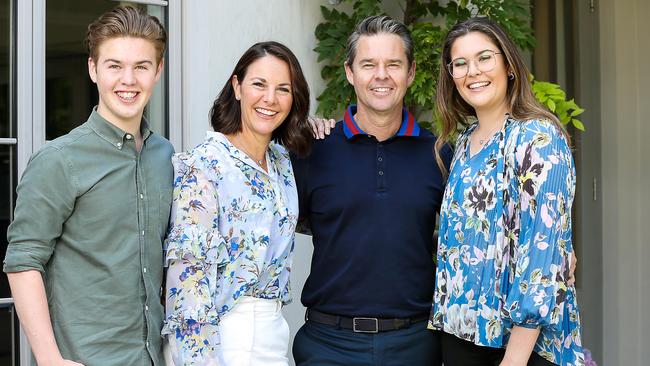
Fiona Byrne
Don't miss out on the headlines from Fiona Byrne. Followed categories will be added to My News.
With 16 Grand Slam doubles titles to his name and a spot in the Australian Sports Hall of Fame, tennis great Todd Woodbridge has aced his chosen sport.
On the eve of the Australian Open, Woodbridge, 48, tells of trading shots with royalty, coping with criticism, teaching Tiger Woods the “coolest” shot in the game, and reveals how his brother’s tragic battle with drugs changed his life.
Fiona Byrne: Todd, you have a most unique relationship with the Australian Open.
Todd Woodbridge: The first Australian Open at Melbourne Park was in 1988 and I was the first winner on the opening day. That is a trivial pursuit question. I was on an outside court, I was not on centre court. I was a wildcard recipient and I won in the opening round and from that point I have seen the complete transformation of the Australian Open. To watch it grow into what it is today has been quite extraordinary. I have taken that journey from a junior all the way to a lead broadcaster and everything in between, from moments of despair and pressure and expectation, to winning my first grand slam with Mark Woodforde.
FB: How did ‘The Woodies’, the pairing of you and Mark Woodforde as doubles partners, happen?
TW: I was at a stage with my game when I began to think I could win majors in doubles because I started to beat the people who were winning them. I was playing with Jason Stoltenberg and Jason was a bit iffy about whether he was going to play doubles each week. Mark had just finished playing with John McEnroe. McEnroe said you need to find yourself a new doubles partner who has these qualities, A, B and C. I probably filled two of the three qualities. Meanwhile, I was looking for certain things in a playing partner things that Mark wasn’t. I was looking for someone a bit more mature than me who had won majors and he had won a US Open with McEnroe and was five years older than me. We were a right left playing combination which historically had been key in doubles. Both being Australian was a big thing, because there was that understanding and connective bond, and then there was the fact that our goals were set the same. The first year we played together was 1991 and we won our first major, the Australian Open, in 1992.
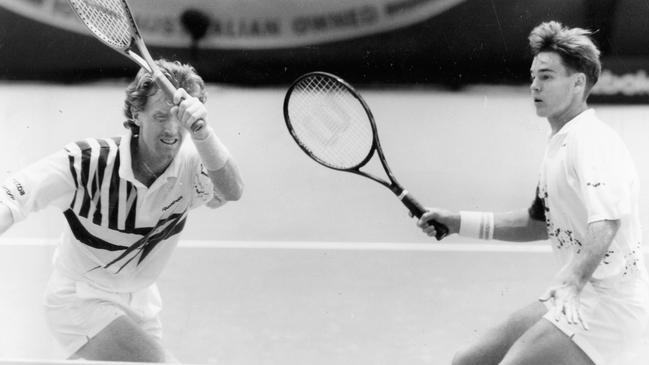
FB: You were the No1 doubles team in the world and won 11 grand slam titles together.
TW: We both saw the same picture, we both wanted the same thing. We complemented each other and our games gelled. On average we won every fourth tournament we played in. Our last tournament together was in Sydney at the Olympics in 2000 where we won silver. Mark was 34 and I was 29 when he finished. I went on to team up with Jonas Bjorkman and we had great success too (winning five grand slam titles). I was the same age, 34, when I finished playing in 2005.
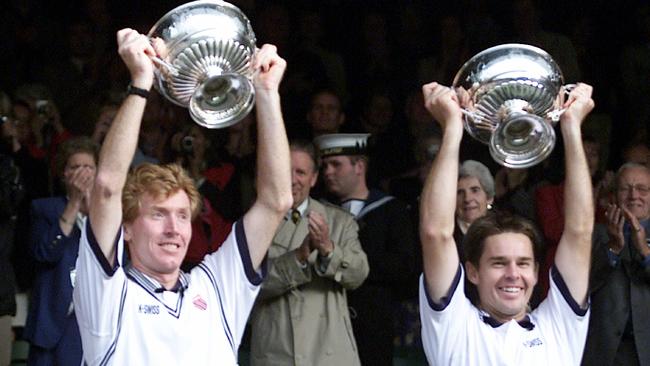
FB: Are you and Woodforde still close?
TW: Yes. We are good friends and what we achieved together is very special. We don’t work a lot together or spend a huge amount of time together. We are very different characters and we live in different countries these days. I am in Melbourne and Mark is in the US. When I moved to America (in the ‘90s) Mark was already living there. He was living in Palm Springs. I settled in Florida where I already had an Australian connection through golf. We created an iconic Australian sports partnership. When you can make it into Australian vernacular as ‘The Woodies’, well, then I think you have done something quite incredible. When Mark retired in 2000, the last year we were on the circuit I commissioned an artist to follow us. He produced two paintings and I presented one to Mark at Wimbledon the following year as a gift of our friendship and our partnership.
FB: Away from tennis you are a keen golfer and are friends with Tiger Woods.
TW: I have known Tiger Woods for 25 years. I caught up with him recently at the President’s Cup. We lived in the same estate in Florida. I have played a lot of tennis with him.
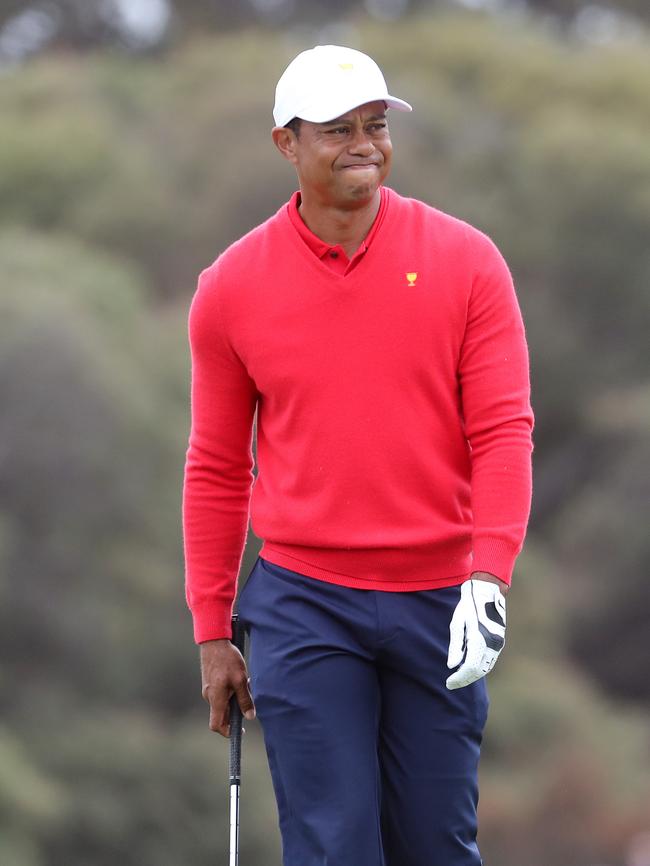
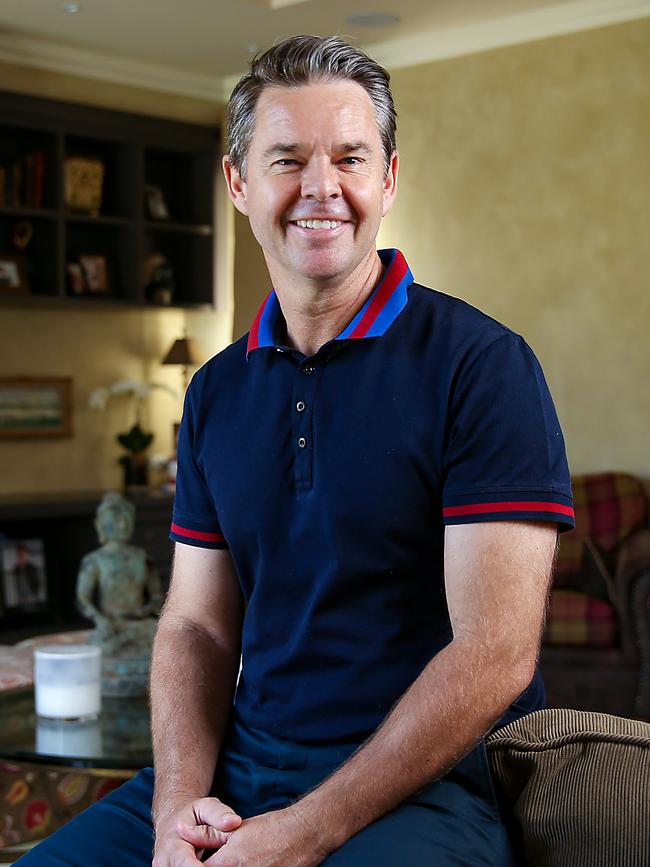
FB: What was it like living next door to Tiger?
TW: Surprisingly it was normal for us and our neighbours in the estate we lived in. He often come over and have dinner with us. It was very normal. What was difficult for him was when he left the estate. He could not just go down to mall on his own. Often when Natasha (Todd’s wife) was going down the road he would give her a shopping list (for groceries) or ask if she could pick up a few things like an item of clothing he had on order at a store. It was very interesting seeing someone living with that degree of fame and celebrity and how that affected his life.
FB: What is Tiger like with a tennis racquet?
TW: People who are as competitive as Tiger, whatever they do they have to be the best they can be at it. Tiger loved to play tennis but what he wanted was a slice backhand. He said, ‘I want your backhand, that is the coolest shot’. I said, ‘it is a nice shot but it is not the best shot’ and he said, ‘but it is so cool, I want you to teach me a slice backhand.’ So we worked on a slice backhand. The problem for him was that he worked out that if he played too much tennis it affected his golf swing. It was to do with the opposites. Golf goes left and tennis goes right with swing paths. He wanted desperately to play but he realised he could not. So there were little pockets were we would play tennis in Orlando together which also meant that I got to play golf often with him.
FB: Did you manage to teach him a slice backhand?
TW: We got to a solid swing, but I did try and convince him he should have had a two-hander (backhand) instead.
FB: Did you face any other surprising players on the court?
TW: I was playing in Monte Carlo with Jonas Bjorkman, Jonas was a resident of Monte Carlo and the palace rang and said, ‘The prince would like to play with you,’. Prince Albert is quite a good player, so it was the prince, Guillermo Vilas, Jonas Bjorkman and myself. Jonas is the resident, so the prince played with Jonas. As we were walking out to our warm up Guillermo, who I was teamed with, said, ‘Todd, you never beat the prince.’ We lost, by the way.
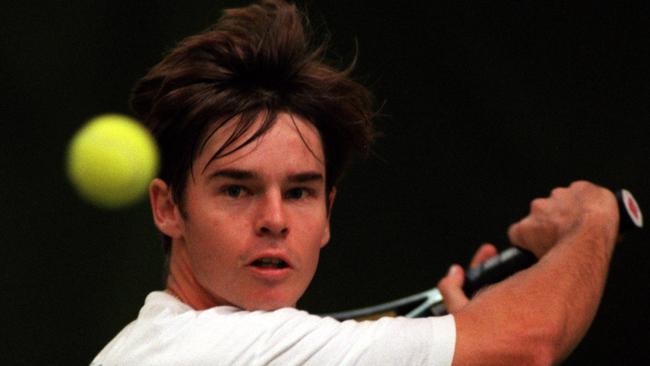
FB: Your oldest brother, Greg, struggled for many years with a serious drug addiction. How did that impact you and your family?
TW: When I was growing up, I remember being about eight at the time, we as a family struggled with my eldest brother Greg who had a heroin addiction. He was 13 years older than me and was addicted from a pretty young age in a time in the ‘70s and early ‘80s when that was the drug of choice for young people. Dad was a policeman and mum was a hairdresser, they were very normal people, and all of a sudden their oldest son had this terrible addiction. I remember dad having to defend him and get him out of debts. There was a time where you were losing your belongs at home because they were going to hock shops. My parents were working extra jobs to give me a career while at the same time paying off drug debts. Mum and Dad did everything they could to help him but as a family there came a point where we had to let go, you have to cut the anchor and just let them drift, and we did that. My father still maintained a relationship where my brother would call and hang up. We knew that was his way of telling us he was alive and it was a check in. Throughout my playing career I knew he watched me, but he would not tell people he was related to me for fear of a backlash, of someone coming to me for an unpaid debt, or causing bad press. I got the opportunity to finally say, ‘It is OK.’ It was not until after I finished playing that he would tell people we were brothers. Greg passed away two and a half years ago at the age of 58. He eventually got off (heroin), but way too late. His health was totally gone. It was very sad. My other brother, Warren, passed away in September 2018 through bone cancer and fibrosis in the lung and that happened very quickly, so I am the last of the brothers standing.
FB: Did your brother’s drug issues motivate your pursuit of tennis?
TW: I was young enough to see the damage it (his addiction) was causing and I did not want that. I knew I needed to do something with myself. I was lucky because I already had tennis in my life. I subconsciously knew it was a vehicle that was going to take me somewhere else, that I could be in my own life and space. I remember getting up in the middle of the night when I was seven or eight years old to watch Wimbledon and thinking, ‘one day I will be part of that.’ From the time I was in a stroller mum played tennis three times a week. As soon as I could walk I was hanging on the fence at the club holding a racquet.
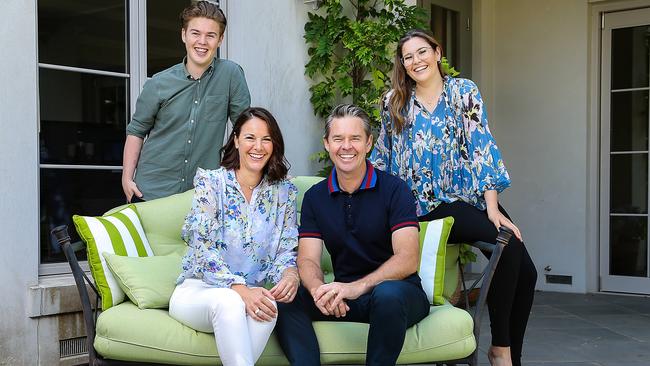
FB: You are an established TV host, working firstly with Channel 7, now with 9. You were criticised for hosting the recent Ashes coverage. How did you take that?
TW: I’m competitive so it made me want to turn up and prove them wrong. I knew that (criticism) was going to happen. All of a sudden the tennis guy turns up at the cricket, I get it. I had been part of Olympic and Commonwealth Games broadcasts and I had commentated golf both on the fairways and in the commentary booth so my experience in media is broader than some people recognise. I think hosting the cricket has changed the way people see me as a broadcaster. There will still be some haters out there but I feel like I have moved from being seen as a former athlete into being seen as a broadcaster because of it.
FB: The Australian Open starts on January 20. What are your thoughts on the state of Australian tennis?
TW: I think we are in a really good place. In tennis your landscape changes every five to seven years, so that landscape we have had of Nick Kyrgios and Bernard Tomic is drawing to a point where Tomic does not sit in that discussion any more. Nick still has got the time and opportunity to do some better things with his tennis, but we have the next generation of Alex de Minaur and Alexei Popyrin coming. The best thing that has happened in tennis in the last 10 years, is Ash Barty. What she has done in 2019, Australian sport needed, not tennis, but sport in general. From the issues that tennis had had, to swimming, to cricket, to the football codes, she brought the dynamic of what Australians believe their sports people are, and should be, like. She has come along at the right time to show what is good about sport, why people play sport, and what can come of actually just performing and getting results. I think a lot of sports and athletes have got stuck in their social media accounts, forgetting that if you win majors, if you win world championships, that is what people really like, that is what they remember.
FB: Who should we be watching out for at the Australian Open?
TW: The one I think is ready to win it is Dominic Thiem. He is playing brilliantly. On the women’s side it is not about breakthroughs it is about who can win. Is it Serena (Williams)? Can Ash Barty perform under enormous pressure and focus? I think she will.
Todd Woodbridge is a Tennis Australia ambassador and will be part of the Australian Open commentary team from January 20 – February 2.
